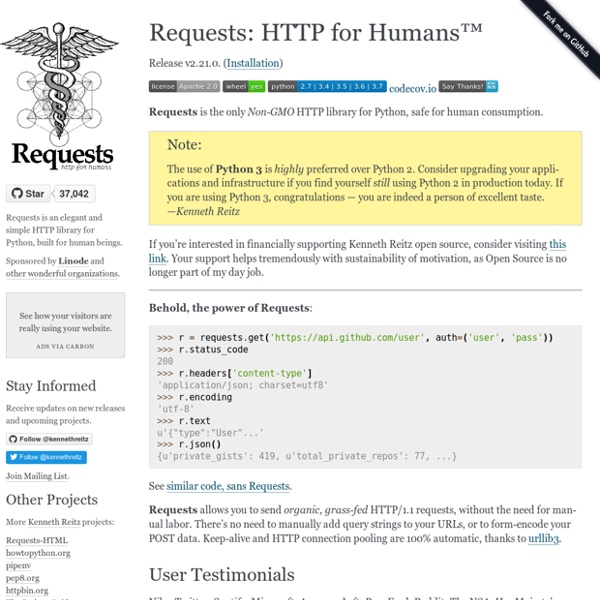



http://docs.python-requests.org/en/master/
Related: PythonThe Python Tutorial — Python 2.7.13 documentation Python is an easy to learn, powerful programming language. It has efficient high-level data structures and a simple but effective approach to object-oriented programming. Python’s elegant syntax and dynamic typing, together with its interpreted nature, make it an ideal language for scripting and rapid application development in many areas on most platforms. The Python interpreter and the extensive standard library are freely available in source or binary form for all major platforms from the Python Web site, and may be freely distributed.
Jinja2 Jinja2 is a modern and designer friendly templating language for Python, modelled after Django’s templates. It is fast, widely used and secure with the optional sandboxed template execution environment: <title>{% block title %}{% endblock %}</title><ul>{% for user in users %} <li><a href="{{ user.url }}">{{ user.username }}</a></li>{% endfor %}</ul>
Flask-OAuth Flask-OAuth is an extension to Flask that allows you to interact with remote OAuth enabled applications. Currently it only implements the consumer interface so you cannot expose your own API with OAuth. Flak-OAuth depends on the python-oauth2 module. Features Support for OAuth 1.0aFriendly APIDirect integration with FlaskBasic support for remote method invocation of RESTful APIs Installation Beautiful Soup Documentation — Beautiful Soup 4.2.0 documentation Beautiful Soup is a Python library for pulling data out of HTML and XML files. It works with your favorite parser to provide idiomatic ways of navigating, searching, and modifying the parse tree. It commonly saves programmers hours or days of work. These instructions illustrate all major features of Beautiful Soup 4, with examples. I show you what the library is good for, how it works, how to use it, how to make it do what you want, and what to do when it violates your expectations.
Top 15 Python Libraries for Data Science in 2017 – ActiveWizards: machine learning company – Medium As Python has gained a lot of traction in the recent years in Data Science industry, I wanted to outline some of its most useful libraries for data scientists and engineers, based on recent experience. And, since all of the libraries are open sourced, we have added commits, contributors count and other metrics from Github, which could be served as a proxy metrics for library popularity. Core Libraries. 1.
Flask-OAuth Flask-OAuth is an extension to Flask that allows you to interact with remote OAuth enabled applications. Currently it only implements the consumer interface so you cannot expose your own API with OAuth. Flak-OAuth depends on the python-oauth2 module. Django at a glance Because Django was developed in a fast-paced newsroom environment, it was designed to make common Web-development tasks fast and easy. Here’s an informal overview of how to write a database-driven Web app with Django. The goal of this document is to give you enough technical specifics to understand how Django works, but this isn’t intended to be a tutorial or reference – but we’ve got both! Beautiful Soup: We called him Tortoise because he taught us. [ Download | Documentation | Hall of Fame | For enterprise | Source | Changelog | Discussion group | Zine ] You didn't write that awful page. You're just trying to get some data out of it. Beautiful Soup is here to help. Since 2004, it's been saving programmers hours or days of work on quick-turnaround screen scraping projects.
Introducing Pandas Objects Welcome back. Please sign in. Welcome back. {* #userInformationForm *} {* traditionalSignIn_emailAddress *} {* traditionalSignIn_password *} {* traditionalSignIn_signInButton *} Ultimate Guide to Web… by Hartley Brody Hopefully you learned a thing or two from my article I Don’t Need No Stinking API: Web Scraping For Fun and Profit. Due to the popularity of that article — almost 100,000 views — I decided to write an even more detailed survey of the field, full of all the web scraping tips and tricks I've picked up. The goal of the book — The Ultimate Guide to Web Scraping — is to hone your skills and help you become master craftsman in the art of web scraping. The Python Tutorial — Python 3.6.2 documentation Python is an easy to learn, powerful programming language. It has efficient high-level data structures and a simple but effective approach to object-oriented programming. Python’s elegant syntax and dynamic typing, together with its interpreted nature, make it an ideal language for scripting and rapid application development in many areas on most platforms. The Python interpreter and the extensive standard library are freely available in source or binary form for all major platforms from the Python Web site, and may be freely distributed.
I Don’t Need No Stinking API: Web Scraping For Fun and Profit If you’ve ever needed to pull data from a third party website, chances are you started by checking to see if they had an official API. But did you know that there’s a source of structured data that virtually every website on the internet supports automatically, by default? That’s right, we’re talking about pulling our data straight out of HTML — otherwise known as web scraping.
Presentations & Blog Posts — Conda documentation Package, dependency and environment management for any language: Python, R, Ruby, Lua, Scala, Java, Javascript, C/ C++, FORTRAN Conda is an open source package management system and environment management system for installing multiple versions of software packages and their dependencies and switching easily between them. It works on Linux, OS X and Windows, and was created for Python programs but can package and distribute any software. Conda is included in Anaconda and Miniconda. Conda is also included in the Continuum subscriptions of Anaconda, which provide on-site enterprise package and environment management for Python, R, Node.js, Java, and other application stacks. Conda is also available on pypi, although that approach may not be as up-to-date.